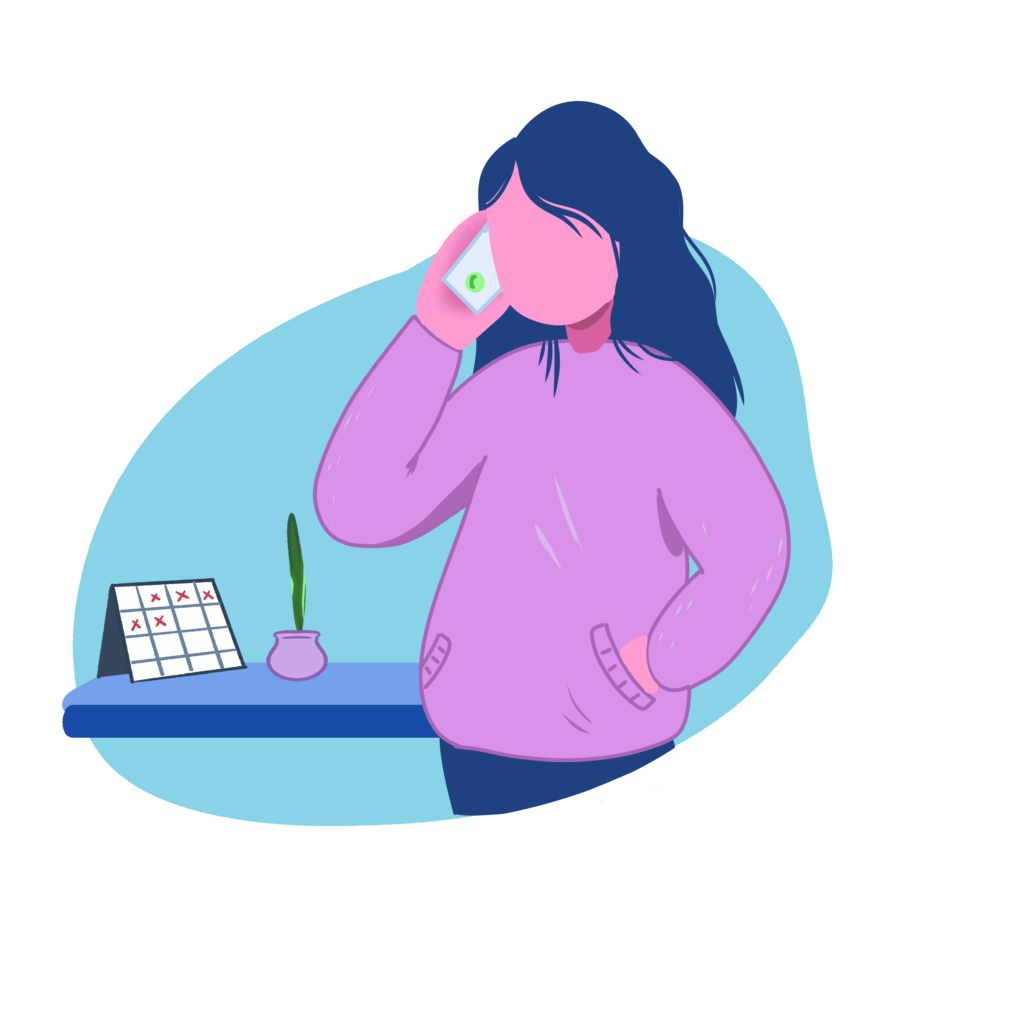Abdominal pains and cramps are common symptoms during menopausal stages and are often related to the decline in oestrogen or hormonal levels of a woman. It could be characterised by sharp pain and discomfort in the stomach and in the lower abdominal or pelvic region for some.
This symptom can be linked to gastrointestinal issues (GI), endometriosis, and uterine fibroids. HRT can be a good option for treating this symptom but you must check first with your physician to have a more profound look on your condition. Read on to know more about this menopausal symptom.
What are Menopause Abdominal Pains or Cramps?
Menopause abdominal pains or period pains, officially recognized as ‘menopausal cramps’, are a typical symptom reported by women going through menopause. The primary reason for these pains is thought to be the varying levels of oestrogen and progesterone, which have an impact on the uterus and the structures around it. These cramps, which cause discomfort and suffering in the lower abdomen, are comparable to those experienced during menstruation but occur throughout the menopausal transition.
These cramps are often described such as stomach pain, lower abdominal pains, and period pains during the menopausal stage. It may feel like a dull ache or a severe cramp that spreads across your entire abdomen or concentrates in the lower pelvic area. It could be temporary or a long-term dweller, and occasionally it even exhibits a periodic pattern similar to your own. In addition to bowel disturbances, bloating, gas, nausea, and vomiting, unexpected vaginal bleeding may cause further worries. It could also signify an underlying condition such as fibroids, endometriosis, or gastrointestinal issues(GI).
Abdominal cramps are just one example of the physical symptoms that the body experiences throughout menopause as it adjusts to the new hormonal balance. This information paves the way for a more thorough understanding of the underlying hormonal changes that cause menopausal discomforts.
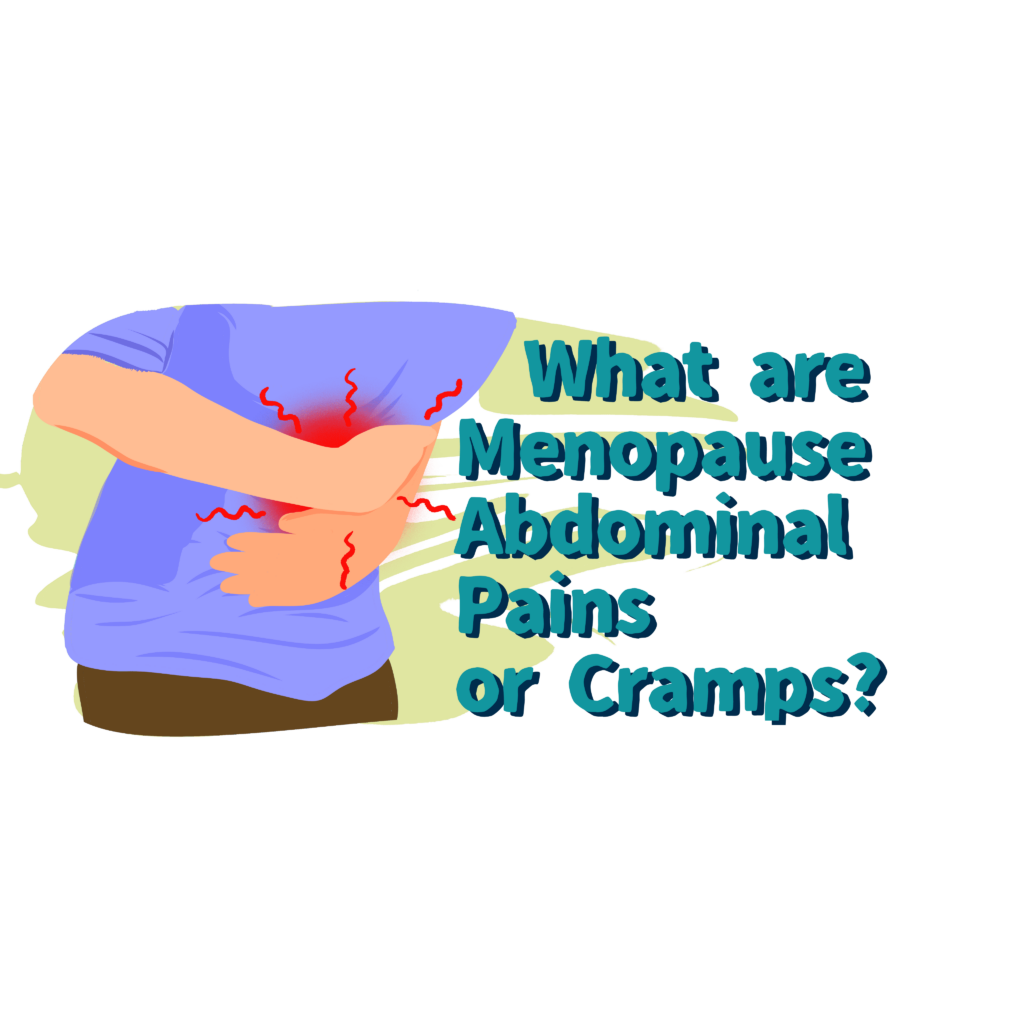
What Causes Menopausal Abdominal Pain and Cramps?
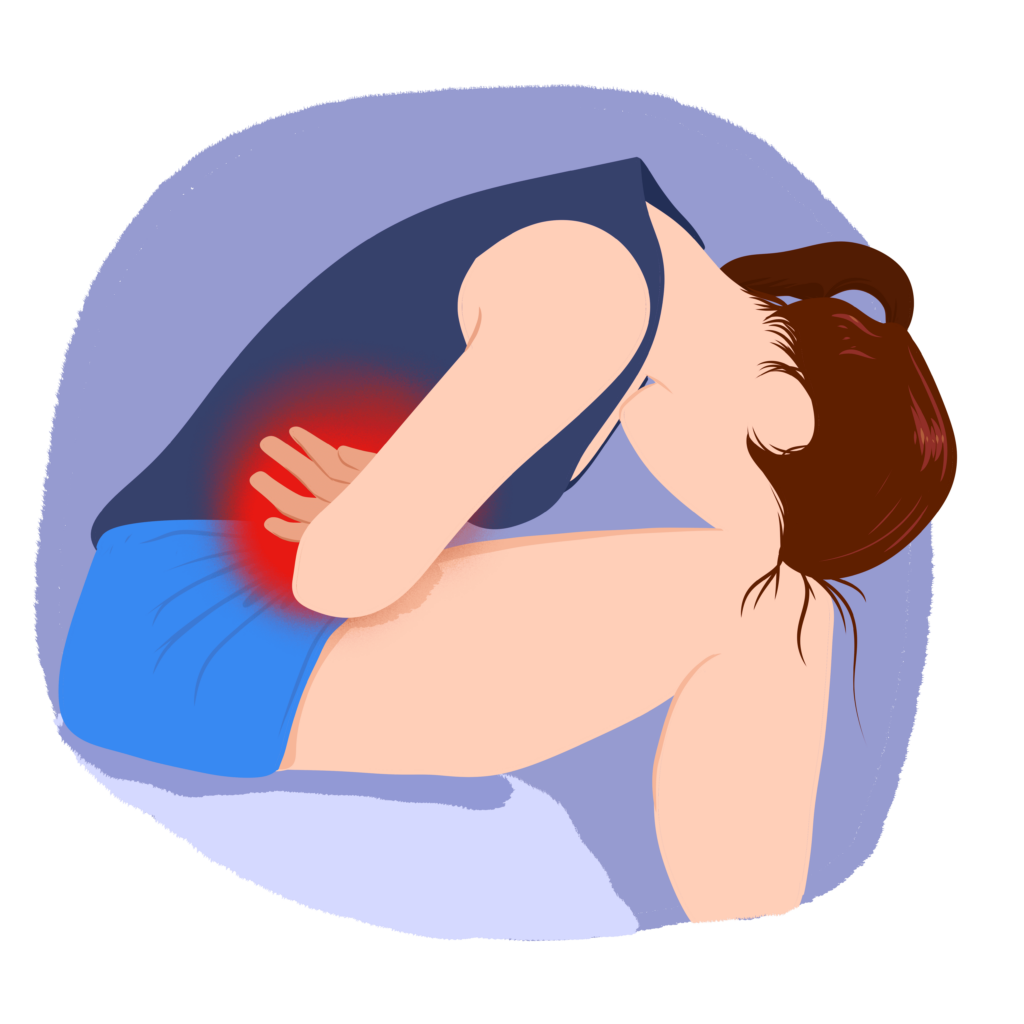
According to the study conducted by Nini Callan, et al., they found out that gastrointestinal (GI) symptoms respond to the fluctuating hormone levels which then increases the gastrointestinal symptoms including abdominal pain around early menopausal transition (perimenopause) when oestrogen hormones begin to fluctuate. Another study by the group of Ali Yosef suggested that stress and anxiety plays a role as well in the existence of abdominal pains symptoms. Due to the number of changes happening during menopause, anxiety is inevitable which then creates a series of other issues as well.
These cramps can be made worse by other factors such as stress, weight increase, and a decrease in physical activity after menopause. Research on the potential of Hormone Replacement Therapy (HRT) to relieve menopausal cramps is still continuing. Its possible alleviation opens the door to a more comprehensive debate on the efficacy and acceptability of HRT in treating menopausal discomforts.
Can HRT stop Menopausal Abdominal Pains?
In a research conducted by Morgan Freeman from the University of Minnesota, it has been found that post-menopausal women on HRT were 80% less likely to have an inflammatory bowel disease (IBD) flare, a type of gastrointestinal (GI) symptoms. These IBD could range from diarrhoea, abdominal pain, fatigue, and even rectal bleeding. Hence, since HRT can help alleviate IBD, it goes without saying that it could also help alleviate abdominal pains as well.
However it’s important to remember that HRT is not a universally applicable treatment and might not be appropriate for everyone, particularly for those who are at higher risk of certain illnesses. In order to decide on the best course of action, ladies should speak with their healthcare practitioners.

What are the Treatments for Menopausal Period Pains?
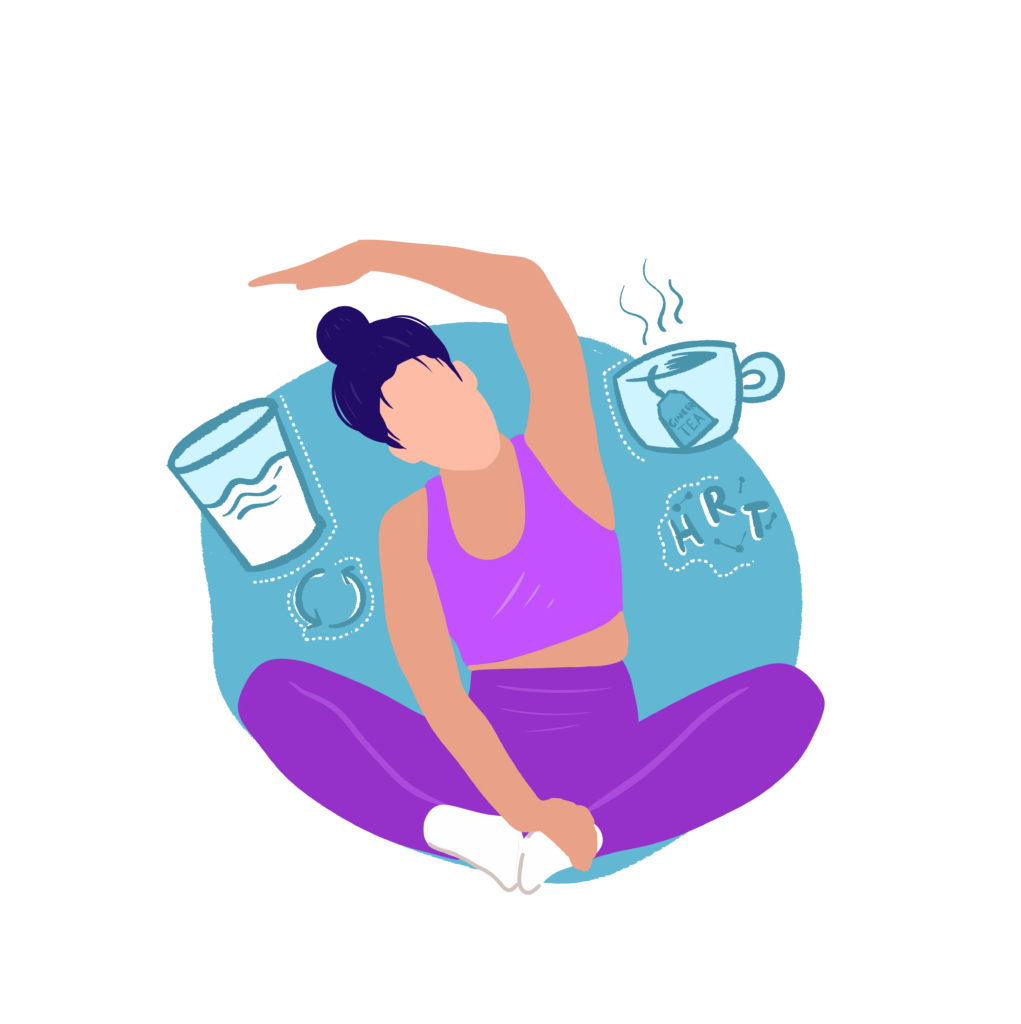
Menopausal period aches can also be managed holistically using over-the-counter pain relievers, alternative therapies, and lifestyle changes in addition to hormone replacement therapy. Many strategies are used to alleviate menopausal period discomfort, from lifestyle changes to medication therapies. Below are a list of potential treatments for menopausal abdominal pains or cramps:
Hydrate Regularly
It’s important to remember that while staying hydrated could help in some situations, it might not be an effective treatment for other forms of stomach discomfort. A healthcare professional should be consulted if you have severe or persistent stomach discomfort in order to determine the best course of action and the underlying reason.
Proper Rest and Stress-Relief
Anxiety-related stomach discomfort must be managed effectively by taking into account both the psychological and physical aspects of the symptoms. Deep breathing exercises and mindfulness meditation are examples of relaxation techniques that can be used to assist release tension associated with worry, which may lessen pain in the abdomen.
Stress-relieving activities like working out, keeping a journal, reading, listening to music, or conversing with friends might be beneficial. Sometimes, a person discovers that cutting back on everyday commitments might help them feel less stressed.
Natural Remedies
People can take ginger as a supplement, chew on it as a root, or drink it as a tea to assist ease moderate gastrointestinal symptoms like abdominal pains. Smelling peppermint oil or consuming peppermint tea can also help ease symptoms of an anxious stomach.
Ginger is a gastrointestinal restorative and soothes the stomach. In addition, it contains analgesic, antibacterial, and anti-inflammatory qualities that help treat stomach problems. Its antioxidant properties are beneficial to the general health of the stomach.
Pain Relievers
Depending on the severity of their discomfort, people may think about using over-the-counter pain medicines to ease their abdominal pain. For pain related to inflammation, nonsteroidal anti-inflammatory medicines (NSAIDs) such as ibuprofen (Advil, Motrin) or naproxen (Aleve) may be helpful. However, it is recommended to take them with food or milk to reduce the possibility of stomach upset.
Nonetheless, in order to identify the best course of action and address any underlying reasons, it’s imperative to follow prescribed dose guidelines and speak with medical professionals, particularly if the pain continues, gets worse, or is accompanied by other worrisome symptoms.
Hormone Replacement Therapy
In most cases, hormone replacement therapy (HRT) is not recommended as the first line of treatment for abdominal pain. Hormonal therapy may be taken into consideration if abdominal pain is associated with changes in hormones, as in the case of endometriosis or menstrual cramps. But before using HRT, you should speak with a healthcare professional who can evaluate your unique circumstances and consider things like your health history, present condition, and any possible hazards related to hormone therapy.
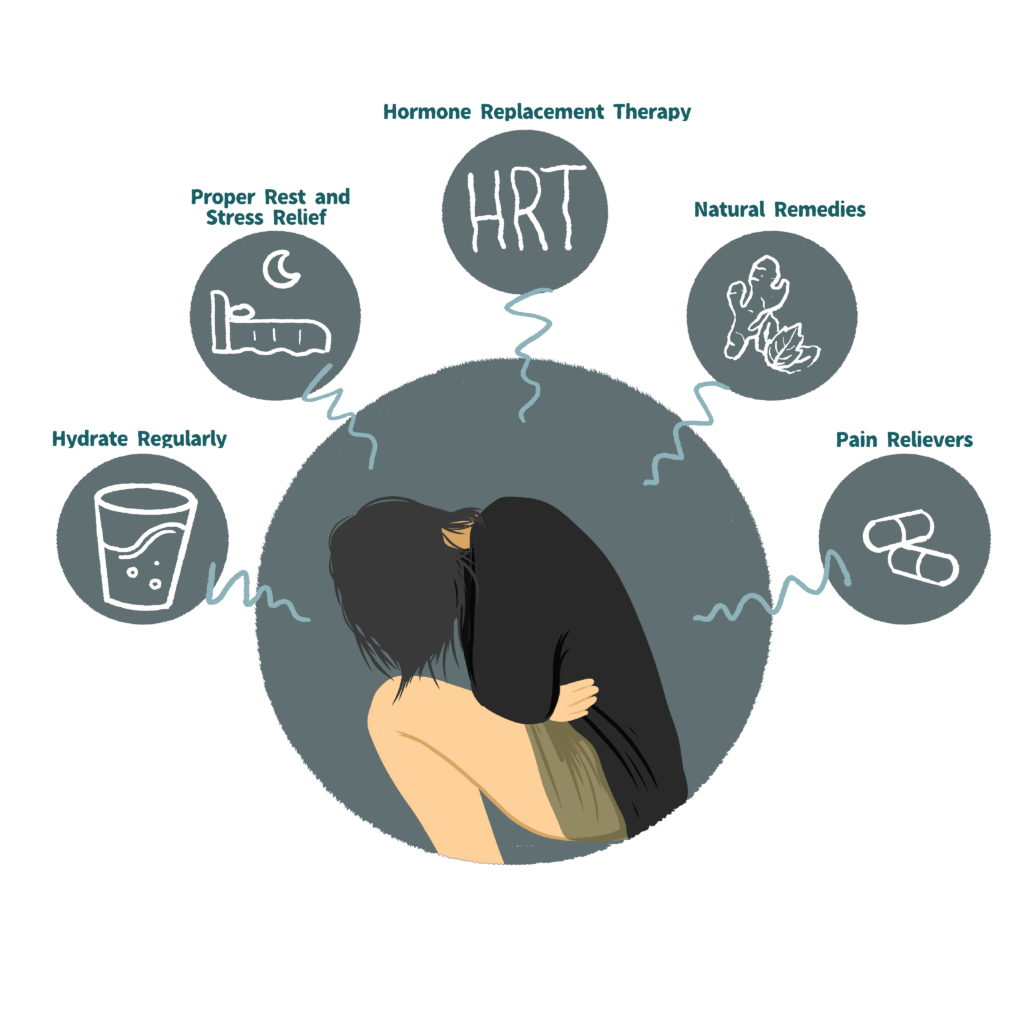
Which Other Gynaecological Conditions May Be Associated with Cramps and Abdominal Pain?

These pains frequently accompany a variety of other menopausal symptoms.
Below are the ones of the closely related menopausal issues with abdominal pain and cramps:
Uterine Fibroids
When Should You See a Doctor?
Managing the complex nature of menopausal period abdominal pains and cramps requires a comprehensive approach that combines self-care with professional medical guidance. To properly manage these symptoms, it is important to know when to seek help. Women should pay attention to their bodies and not write off severe or ongoing discomfort as a normal part of menopause.
Abdominal pain during menopause may occasionally be associated with underlying diseases including fibroids, endometriosis, or gastrointestinal (GI) disorders. It is important that you seek medical attention if you have irregular bleeding, digestive problems, chronic or worsening abdominal pain, or any other symptoms that raise concerns.
To help you determine the root cause of abdominal pain and suggest the best course of action, you may contact us at OMC so we can perform a comprehensive evaluation that includes a review of the patient’s medical history, a physical examination, and potentially imaging testing.
Contact us today to see how we can help deal with the symptoms you’re experiencing.
